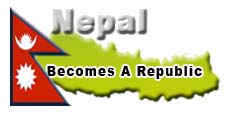Nepal abolishes monarchy, becomes a republic
 Kathmandu - Nepal's constituent assembly Wednesday voted overwhelmingly to abolish the monarchy and declared the country a federal democratic republic.
Kathmandu - Nepal's constituent assembly Wednesday voted overwhelmingly to abolish the monarchy and declared the country a federal democratic republic.
The historic vote brought to an end the 240 years of the Shah Dynasty that has ruled Nepal since its unification by King Prithvi Narayan Shah who rose out of a small principality of Gorkha in western Nepal.
Nepal's home minister presented the proposal to convert the country into a republic which was voted on by the members.
"The constituent assembly voted by 560 in favour of the proposal and four against," said Kulbahadur Gurung who presided over the historic meeting.
"Because the number of votes in favour of the proposal is a majority of those present and voting, the proposal has been adopted." Gurung said.
"As the democratic republic has been implemented in Nepal, the then king and his private secretariat must be leave the Narayanhiti Royal Palace within 15 days," Gurung announced to the cheering assembly.
The five-point proposal to remove the monarchy was hammered out after marathon talks between leading political parties.
The meeting started over 10 hours later than scheduled.
"The first meeting of the constituent assembly announces that Nepal is declared a federal democratic republic," the adopted proposal read. "All rights, privileges and titles accorded to the then king, his family and his relatives that are in excess to those received by the citizens will automatically cease."
The proposal which was adopted also stripped all privileges and cultural rights accorded to the monarch and his family and made them ordinary citizens of the country.
The proposal also called for the Narayanhiti Royal palace to be converted into a "historic museum."
Earlier, addressing the historic session of the assembly, Prime Minister Girija Prasad Koirala said this was the moment he had looked forward to all his political life.
"This is the day my dreams have been realised ... probably today is the day the nation's dreams have been fulfilled," said Koirala, 84, frail looking and reportedly unwell.
"I believe that the people will be sovereign," Koirala said. "Now all the violence should cease and our effort should focus on economic progress and peace and development of the country."
The election of the constituent assembly and Wednesday's voting capped Nepal's fledgling moves to peace following the formal end to a communist insurgency nearly one and half years ago.
The fall of Nepal's last king, Gyanendra, began in February 2005 after he seized full executive powers and jailed top politicians despite widespread criticism from the international community.
He was forced to give up much of his power after a mass movement in April 2006 led by a seven party alliance including the Maoists.
The scrapping of the monarchy and the election of the constituent assembly was one of the key demands of the Maoists when they launched their insurgency.
The decade-long civil war killed nearly 14,000 people and displaced over 200,000. (dpa)